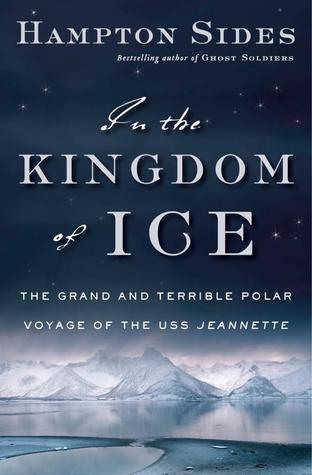More on this book
Community
Kindle Notes & Highlights
Read between
April 28 - May 3, 2023
“pagophile”—a creature that is happiest in the ice.
There, in a sense, chronology stood still, for at the pole all the time zones of the world converged.
It was a British naval officer, William Parry, who in 1827 led what is widely regarded as the first serious expedition specifically aiming to reach the North Pole.
The British primarily focused their efforts on finding a navigable sea route across the top of Canada—and on searching for previous English expeditions that had disappeared while looking for this elusive Northwest Passage.
But in 1867, the United States had purchased Alaska from the czar for the paltry sum of $7.2 million, and this enormous new frontier lay untapped and largely unknown. Thus the national movement west, having reached California, had taken a right turn and become a movement north.
The United States in the 1870s was, De Long knew, far from being a world-class naval power. Although the U.S. Navy was slowly making advancements, many European nations viewed the tiny, antiquated American fleet as a joke. According to naval historian Peter Karsten, it was “a third-rate assemblage” of “old tubs” in “various states of disrepair … the laughingstock of the world.” Far from an adventurous existence, life in the American Navy was marked by cramped quarters, low pay, draconian discipline, and jealous competition for rank in a promotion process that could be stultifying and slow.
...more
During the Civil War, the Lincoln administration thought it prudent to move the Naval Academy from its Annapolis campus to a hodgepodge of buildings in Newport, and so Rhode Island is where De Long spent his years as a midshipman.
Throughout his career, De Long would prove to be a man unafraid to badger his superiors in order to get things done. “He got what he wanted,” Emma said, “because he dared to ask for it.”
The idea, widely believed by the world’s leading scientists and geographers, went like this: The weather wasn’t especially cold at the North Pole, at least not in summer. On the contrary, the dome of the world was covered in a shallow, warm, ice-free sea whose waters could be smoothly sailed, much as one might sail across the Caribbean or the Mediterranean. This tepid Arctic basin teemed with marine life—and was, quite possibly, home to a lost civilization. Cartographers were so sure of its existence that they routinely depicted it on their maps, often labeling the top of the globe,
...more
At the Japanese pavilion, a miraculously fast-growing pea plant called kudzu was unveiled to an unsuspecting Western world. Elsewhere, the crowds could gaze upon new works by Rodin, listen to concerts played on the world’s largest pipe organ, or marvel at the immense handheld torch of Frédéric-Auguste Bartholdi’s Lady Liberty (the rest of her was still under construction in France). It was here, at the Centennial Exhibition, that the American masses were introduced to a new condiment called Heinz ketchup, to a fizzy sassafras concoction sold under the name Hires Root Beer, and to the perfect
...more
Bennett had decided to rename her the Jeannette, after his sister. He had chartered a train from Paris and brought along his usual entourage of fashionable rogues and sportsmen, plus a few newshounds from the Herald to cover the proceedings. Jeannette had come as well, and traveling with her—or as close as Victorian courtship protocols would allow—was her beau, Isaac Bell, a wealthy New York cotton broker and investment tycoon.
FROM THE STANDPOINT of the sea gods, rechristening the Pandora could be seen as a dubious exercise. As though her original mythological name weren’t already heavy enough, a superstition had long held among some mariners that no ship should ever be renamed. Some claimed that it insulted a vessel’s very soul; others said it was just a bad idea, the epitome of tempting fate.
Jeannette would hasten back to New York with Isaac Bell. Within a few months they would marry, and soon they would start building one of Newport’s elegant “cottages.” Stanley would return to further exploits in Africa, and to a career that would see him both knighted and demonized, his brutal adventures partly inspiring Joseph Conrad’s Heart of Darkness.
A few days later, Dr. Ambler told De Long of a curious dream he’d had about Edison’s lamps. In the dream, Sir John Franklin, the long-lost British explorer, had come aboard the Jeannette for a tour. Dr. Ambler led Franklin all over the ship and told him excitedly about Edison’s electric lights, an invention that, of course, wasn’t even dreamed about in Franklin’s day. But Franklin bluntly interrupted him. “Your electric machine,” he said, “is not worth a damn.”
She had sunk at latitude 77°15 N, longitude 155° E, a little more than seven hundred miles south of the North Pole.
The systematic introduction of just a few things—repeating rifles, booze, money, industrial methods of dismantling animal flesh—had caused the native cultures of Alaska to collapse at record speed.
Wrangel boasts such an astonishing abundance of wildlife that biologists would later call it the Galápagos of the Far North. The island supports the largest population of Pacific walruses as well as one of the most extensive snowgoose colonies on earth. It is also home to snowy owls, Arctic foxes, and massive populations of lemmings and seabirds—yet in pleasant contrast to the Siberian mainland, there are no mosquitoes.)
THE THEORY OF the Open Polar Sea essentially died with the Jeannette voyage, although recent climate projections show that by 2050, significant portions of the polar pack will entirely melt in summertime.
Today, the George W. Melville Award is the Navy’s highest honor for accomplishments in nautical engineering.


